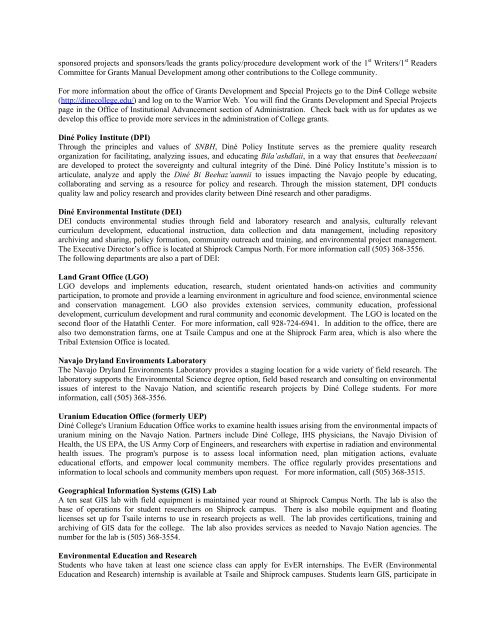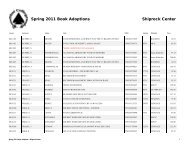Diné College Course Catalog 2008-2009 (pdf)
Diné College Course Catalog 2008-2009 (pdf)
Diné College Course Catalog 2008-2009 (pdf)
You also want an ePaper? Increase the reach of your titles
YUMPU automatically turns print PDFs into web optimized ePapers that Google loves.
sponsored projects and sponsors/leads the grants policy/procedure development work of the 1 st Writers/1 st Readers<br />
Committee for Grants Manual Development among other contributions to the <strong>College</strong> community.<br />
For more information about the office of Grants Development and Special Projects go to the Din4 <strong>College</strong> website<br />
(http://dinecollege.edu/) and log on to the Warrior Web. You will find the Grants Development and Special Projects<br />
page in the Office of Institutional Advancement section of Administration. Check back with us for updates as we<br />
develop this office to provide more services in the administration of <strong>College</strong> grants.<br />
<strong>Diné</strong> Policy Institute (DPI)<br />
Through the principles and values of SNBH, <strong>Diné</strong> Policy Institute serves as the premiere quality research<br />
organization for facilitating, analyzing issues, and educating Bila’ashdlaii, in a way that ensures that beeheezaani<br />
are developed to protect the sovereignty and cultural integrity of the <strong>Diné</strong>. <strong>Diné</strong> Policy Institute’s mission is to<br />
articulate, analyze and apply the <strong>Diné</strong> Bi Beehaz’aannii to issues impacting the Navajo people by educating,<br />
collaborating and serving as a resource for policy and research. Through the mission statement, DPI conducts<br />
quality law and policy research and provides clarity between <strong>Diné</strong> research and other paradigms.<br />
<strong>Diné</strong> Environmental Institute (DEI)<br />
DEI conducts environmental studies through field and laboratory research and analysis, culturally relevant<br />
curriculum development, educational instruction, data collection and data management, including repository<br />
archiving and sharing, policy formation, community outreach and training, and environmental project management.<br />
The Executive Director’s office is located at Shiprock Campus North. For more information call (505) 368-3556.<br />
The following departments are also a part of DEI:<br />
Land Grant Office (LGO)<br />
LGO develops and implements education, research, student orientated hands-on activities and community<br />
participation, to promote and provide a learning environment in agriculture and food science, environmental science<br />
and conservation management. LGO also provides extension services, community education, professional<br />
development, curriculum development and rural community and economic development. The LGO is located on the<br />
second floor of the Hatathli Center. For more information, call 928-724-6941. In addition to the office, there are<br />
also two demonstration farms, one at Tsaile Campus and one at the Shiprock Farm area, which is also where the<br />
Tribal Extension Office is located.<br />
Navajo Dryland Environments Laboratory<br />
The Navajo Dryland Environments Laboratory provides a staging location for a wide variety of field research. The<br />
laboratory supports the Environmental Science degree option, field based research and consulting on environmental<br />
issues of interest to the Navajo Nation, and scientific research projects by <strong>Diné</strong> <strong>College</strong> students. For more<br />
information, call (505) 368-3556.<br />
Uranium Education Office (formerly UEP)<br />
<strong>Diné</strong> <strong>College</strong>'s Uranium Education Office works to examine health issues arising from the environmental impacts of<br />
uranium mining on the Navajo Nation. Partners include <strong>Diné</strong> <strong>College</strong>, IHS physicians, the Navajo Division of<br />
Health, the US EPA, the US Army Corp of Engineers, and researchers with expertise in radiation and environmental<br />
health issues. The program's purpose is to assess local information need, plan mitigation actions, evaluate<br />
educational efforts, and empower local community members. The office regularly provides presentations and<br />
information to local schools and community members upon request. For more information, call (505) 368-3515.<br />
Geographical Information Systems (GIS) Lab<br />
A ten seat GIS lab with field equipment is maintained year round at Shiprock Campus North. The lab is also the<br />
base of operations for student researchers on Shiprock campus. There is also mobile equipment and floating<br />
licenses set up for Tsaile interns to use in research projects as well. The lab provides certifications, training and<br />
archiving of GIS data for the college. The lab also provides services as needed to Navajo Nation agencies. The<br />
number for the lab is (505) 368-3554.<br />
Environmental Education and Research<br />
Students who have taken at least one science class can apply for EvER internships. The EvER (Environmental<br />
Education and Research) internship is available at Tsaile and Shiprock campuses. Students learn GIS, participate in








